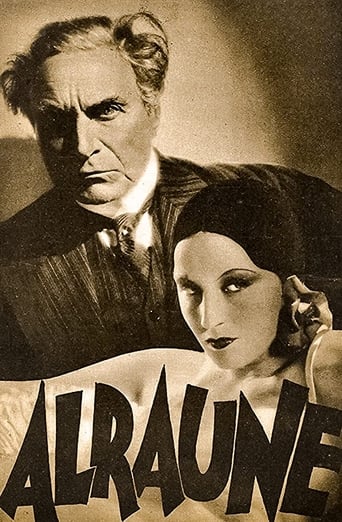Richard Chatten
With the exception of Brigitte Helm in the title role, this sound remake of the classic 1928 silent has an entirely different cast and crew, and is a pretty impressive piece of work in its own right.Brigitte Helm this times doubles up as both Alraune and as her drunken mother Alma singing in a bar in chiaroscuro close-up and a wet-look pencil skirt in a prologue set in 1913. The supporting cast is full of familiar faces from both German silents (Bernhard Goetzke) and Hollywood talkies (Martin Kosleck as a young admirer named Wolfgang Petersen), and the bulk of the action is this time explicitly identified with late Weimar Germany, with the year specifically stated as 1930, complete with a chassis-hugging dress of the period for Miss Helm in one scene, and imposing sets by Otto Erdmann & Hans Sohnle noirishly lit by Günther Krampf. All in all a film crying out for a decent restoration.
Brandin Lindsey
Alraune is a 1930 German film with elements of science fiction and drama. The story follows a scientist, Privy Councillor ten Brinken, who discovers how to create artificial life, which is basically artificial insemination. After successfully creating dozens of "artificial rats", ten Brinken's ambition drives him to attempt to create an "artificial human". The Privy Councillor then raises his creation under the guise of an adopted niece.Alraune has a fascinating plot and is a great example of an early science fiction film. The first act will draw you in as your imagination runs wild wondering could possibly happen next. The words used to send ten Brinken to conduct such an experiment, "Do you want someone else to beat you to it?" is an excellent motivation for the character. This removes some of the malice from his deeds and adds a tragic element to the whole affair. Wanting to be the best is a motivation anyone can relate to, especially when it is related to work or academia. But how far will you go to achieve such heights?Despite how interesting the first act is, the film slows to a boring halt afterward. By the end of the movie, it is unclear exactly what the conflict of the story was. You would think that the bulk of the premise would be the main character's conflict with her identity, or something related. Or perhaps diving further into the Privy Councillor's other "expensive experiments". Instead, something intriguing happens in the beginning of the story, and that's really all there is to it. The film starts very strong but begins to atrophy after the first few scenes. There are a few spots of bad acting, but not enough to ruin a scene. For example, you may see the "stink- eye" or "hands-on- hips" type of overacting from a few of the supporting characters. Lastly, I found it difficult to keep track of which character was which. There is little character development before the film leaps forward seventeen years, leaving the viewer somewhat confused in the new setting.Despite some of these flaws, Alraune is an intriguing film. The first act is fantastic, not to mention how interesting some of the scientific ideas are. There are many fun directions the film can go after the third act, leaving you with plenty of thriller/science fiction ideas of your own. Anyone interested in these genres will find plenty to like in this film.
zimmer-9
This 1930 version of the German fantasy classic "Alraune" is a more faithful adaptation of the book than its more famous 1928 silent film predecessor and follows very much the story line of its literary source. Brigitte Helm, one of Europe's most intriguing vamps of the 20s and early 30s this time gives a different interpretation of the same part she had in the silent version two years ago. She not only portrays Alraune, the artificially created girl who brings down men by the dozen but also her mother, a prostitute who agrees to take part in an experiment of artificial insemination and even performs as a singer in a bar reminiscent of "The blue angel" (which was produced around the same time). In this film, Alraune, when finding out about her true identity, feels remorse over her deeds and in the end commits suicide. The film, much more than the silent version, is a daring mix of sex and crime and must have been rather scandalous at its time. Oswald does an excellent job in recreating the atmosphere of Wilhelminian Germany in the beginning of the film and then creates sexual tension and suspense in the house of Professor ten Brinken, where Alraune plays around with men like the toys in her bedroom. Great performances by Albert Bassermann as her creator/ stepfather who falls for her and Harald Paulsen, who also starred in Oswalds horror classic "Unheimliche Geschichten". Another classic from the rich period of German cinema before 1933 and a film that could never have been made that way in Hollywood.


